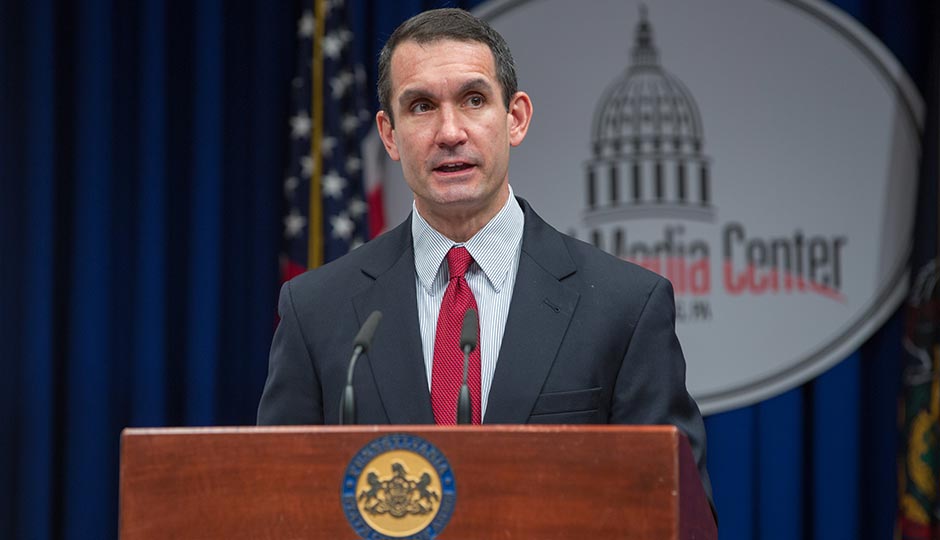State-Funded Anti-Abortion Group Sues Pa. Auditor General

Eugene DePasquale
A state-funded anti-abortion group under financial investigation has sued Pennsylvania’s auditor general.
The group, Real Alternatives, alleges that auditor general Eugene DePasquale does not have the authority to investigate how the organization spends what he says is taxpayer money. It’s the first time DePasquale has ever been sued by an organization under audit.
The Department of Human Services, which administers the program, first began auditing Real Alternatives in August of 2015, according to the Pittsburgh Post-Gazette. Last year, the newspaper reported that Pennsylvania’s Bureau of Financial Operations found that though Real Alternatives was “generally in compliance with the grant requirements,” questions were raised regarding 3 percent fees that the organization charges subcontractors.
First, some background on the organization: Real Alternatives, which has received state funding for about 20 years, works to “provide government-funded alternatives to abortion services throughout Pennsylvania.” Its president and CEO is a lawyer named Kevin Bagatta. Bagatta previously worked for the late William Ball, a pro-life Pennsylvania Catholic Conference lawyer who attempted to fight the state’s 1965 plan to counsel low-income couples on contraception, according to Cosmopolitan.
Real Alternatives claims it has provided over 273,000 women with counseling and has aided the implementation of similar taxpayer-funded programs in 14 other states, including Texas and Michigan. The Post-Gazette reports that the organization’s agreement with the state allows counselors to ask a woman questions like, “Does she believe in God?” or “How does her faith impact the choices she makes?” The policy states that the questions “are not meant to promote a certain religion,” but to “[paint] a picture … of this woman’s value system,” according to the newspaper.
In 2015, DePasquale told the Post-Gazette that he was “surprised to hear the program existed” and that, to the best of his knowledge, none of his predecessors had audited it. The program has received about $7 million a year, according to NewsWorks. It has a five-year, $30 million contract with the state.
Through that contract, the nonprofit uses state and federal funding to support at least 95 sites, including pregnancy centers, adoption agencies, social service agencies and maternity residences. Most of these subcontractors are geared toward convincing women not to have abortions – and all of them, per the organization’s policies, are prohibited from promoting or dispensing contraception, according to Cosmo.
Real Alternatives charges those subcontractors a 3 percent fee, which it claims goes toward promoting and expanding its local and national initiatives. DePasquale wants to take a closer look at the funds – which he said amount to almost $1 million over five years.
“What is it in that 3 percent fee that they so want to hide from the people of Pennsylvania?” he said, according to NewsWorks. “Are they funneling campaign contributions? I mean what are they doing with that money?”
The organization has previously claimed that the funds derived from the 3 percent fees are not subject to audit because they are “corporate” funds, according to Cosmo. In a statement released following the lawsuit, Real Alternatives said it “takes very seriously its responsibility to be a good steward of taxpayer money.”
“In addition to having contracts with multiple states using public funds, Real Alternatives also has other corporate contracts using private funds,” the statement continues. “The Pennsylvania Department of Human Services (DHS) and now the Pennsylvania Auditor General (AG) are attempting to audit expenses related to Real Alternatives’ non-government, private contracts expenses using private funds. DHS and the AG have no legal authority over these privately funded contracts.”
DePasquale has said that such a lawsuit is extremely rare – and warrants skepticism.
“It is outrageous that a simple request for documents about how nearly $1 million in taxpayer funds was spent is met with a raft of legal action,” DePasquale said in a statement. “The idea that any organization receiving public funds would hide behind the courts to keep taxpayers in the dark makes my blood boil.”
Follow @ClaireSasko on Twitter.


